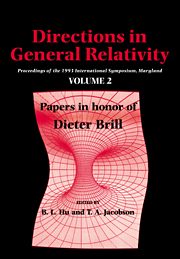 Directions in General Relativity
Directions in General Relativity Published online by Cambridge University Press: 06 January 2010
Abstract
We use a λΦ4 scalar quantum field theory to illustrate a new approach to the study of quantum to classical transition. In this approach, the decoherence functional is employed to assign probabilities to consistent histories defined in terms of correlations among the fields at separate points, rather than the field itself. We present expressions for the quantum amplitudes associated with such histories, as well as for the decoherence functional between two of them. The dynamics of an individual consistent history may be described by a Langevintype equation, which we derive.
Dedicated to Professor Brill on the occasion of his sixtieth birthday, August 1993
Introduction
Interpretations of Quantum Mechanics and Paradigms of Statistical Mechanics
This paper attempts to bring together two basic concepts, one from the foundations of statistical mechanics and the other from the foundations of quantum mechanics, for the purpose of addressing two basic issues in physics:
the quantum to classical transition, and
the quantum origin of stochastic dynamics.
Both issues draw in the interlaced effects of dissipation, decoherence, noise, and fluctuation. A central concern is the role played by coarse-graining —the naturalness of its choice, the effectiveness of its implementation and the relevance of its consequences.
To save this book to your Kindle, first ensure [email protected] is added to your Approved Personal Document E-mail List under your Personal Document Settings on the Manage Your Content and Devices page of your Amazon account. Then enter the ‘name’ part of your Kindle email address below. Find out more about saving to your Kindle.
Note you can select to save to either the @free.kindle.com or @kindle.com variations. ‘@free.kindle.com’ emails are free but can only be saved to your device when it is connected to wi-fi. ‘@kindle.com’ emails can be delivered even when you are not connected to wi-fi, but note that service fees apply.
Find out more about the Kindle Personal Document Service.
To save content items to your account, please confirm that you agree to abide by our usage policies. If this is the first time you use this feature, you will be asked to authorise Cambridge Core to connect with your account. Find out more about saving content to Dropbox.
To save content items to your account, please confirm that you agree to abide by our usage policies. If this is the first time you use this feature, you will be asked to authorise Cambridge Core to connect with your account. Find out more about saving content to Google Drive.